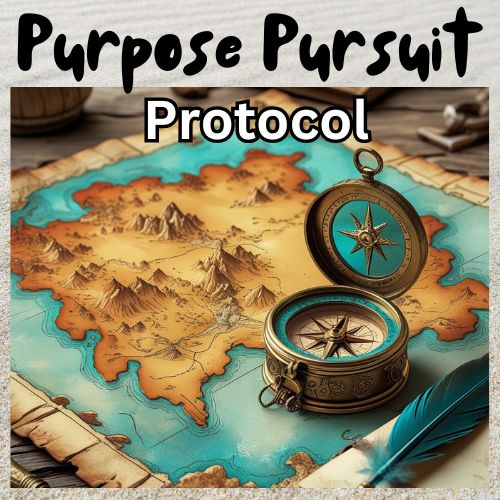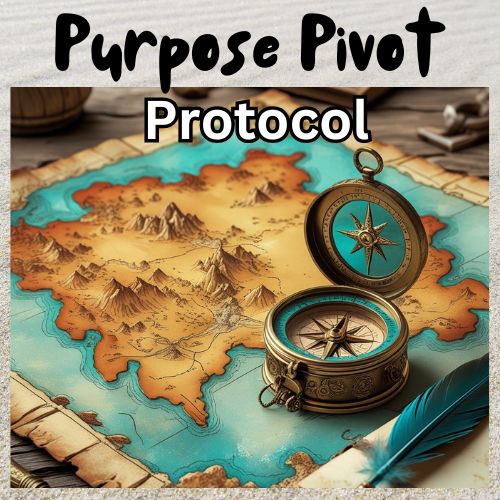Most people think purpose is a destination—a job title or career path they need to “find.” This post challenges that notion by reframing purpose as a verb (an action) rather than a noun (an identity). When you identify your purpose verb (like “to guide,” “to empower,” or “to create”), you become untethered from any single role and can find meaning across every life chapter—career changes, retirement, unexpected pivots. Includes real client stories, a comprehensive verb catalog, and a practical exercise to help readers discover their own verb.
“What’s my purpose?” we wonder, scrolling through LinkedIn at 2 AM, convinced that everyone else has figured it out. We think the answer is hiding in a job title, a career pivot, or some cosmic calling we haven’t yet discovered.
We’re told to “find our purpose” like it’s a destination on a map. A place we’ll arrive at and finally exhale: This is it. This is what I’m meant to be.
But here’s the bold take that might shift everything: Your life’s purpose isn’t a noun. It’s a verb.
The Job Title Trap
The conventional approach to purpose is dangerously static. We conflate what we do with who we are. We think purpose looks like:
- “I’m meant to be a teacher.”
- “My purpose is to be an entrepreneur.”
- “I was born to be a doctor.”
This creates a brittle, anxiety-inducing framework. What happens when you lose that job? When you retire? When the industry shifts? When your body can’t keep up? When life hands you a plot twist you didn’t see coming?
I’ve been there.
If your purpose is a title, you’re one layoff, one health crisis, one life transition away from an existential meltdown.
I learned this the hard way. Five years ago, I had to reconstruct my life from scratch—yet again. And in that reconstruction, I discovered something liberating: My purpose wasn’t what I was doing. It was how I was showing up. My purpose wasn’t a destination. It was a direction. A verb.
My verb is to guide.
I can guide as a coach. As a writer. As a speaker. As a friend over coffee. As a stranger offering directions. The context changes, but the core action—the verb—remains constant. That realisation didn’t just give me clarity. It gave me freedom.
The Portable Life Purpose Framework
When you define your purpose as a verb, you liberate yourself from any single career path. You give yourself permission to find meaning in countless contexts—across industries, roles, and chapters of life.
Think about it: An executive’s purpose might not be “to be a CEO.” It might be to build, to unify, or to solve. A teacher’s purpose might not be “to have a classroom.” It might be to illuminate, to challenge, or to nurture.
The verb transcends the vehicle.
I once worked with a former teacher—let’s call her Maya—who thought losing her classroom meant losing her entire purpose. She’d spent 20 years in education, and when burnout finally forced her out, she felt like she’d lost her identity.
“I don’t know who I am if I’m not a teacher,” she told me.
But here’s what we discovered together: Maya’s purpose was never “to be a teacher.” It was to illuminate—to help people see things they couldn’t see before, to make the complex feel accessible, to create those lightbulb moments.
Once she understood that, everything shifted. She didn’t need a classroom to illuminate. She could do it through writing articles. Through mentoring young professionals. Through explaining complicated medical decisions to her ageing parents. Through hosting a podcast. Through a thousand different contexts that had nothing to do with a grade book or a whiteboard.
Her verb gave her permission to reinvent without losing herself.
From Obsolete to Portable: Elsa’s Story
This framework becomes especially powerful during major life transitions—those moments when the identity we’ve built starts to crumble.
I recently worked with a client named Elsa, a former CMO who’d just retired after 30 years of building brands at the executive level. She came to me because, despite having dreamed of retirement for years, she felt completely unmoored.
“I thought I’d feel free,” she said. “Instead, I feel obsolete.”
She’d been getting calls from headhunters, and part of her was tempted to jump back into another C-suite role—not because she wanted to, but because she didn’t know how else to matter.
We started by exploring the moments in her career when she felt most alive. Not the promotions or the accolades, but the actual doing. What was happening in those moments?
There was a pattern. The board presentation where she rallied everyone around a controversial rebrand. The time she mentored a junior marketer who went on to become a VP. The crisis management situation where she helped her team see they had more capability than they realised.
“What were you actually doing in those moments?” I asked.
She paused. “I was… showing people what they were capable of. I was helping them see their own potential.”
Her verb was to empower.
The relief on her face was immediate. She didn’t need another title. She didn’t need to “be” anything. She just needed to keep doing what she’d always been doing—empowering people to see their own strength.
Within a month, Elsa had connected with a local entrepreneurship incubator. She started volunteering with early-stage founders, helping them navigate the overwhelming early days of building a business. No title. No salary. No corner office.
And yet, she felt more alive than she had in years.
Because her verb hadn’t retired. Only her job had.
The Verb Catalogue: Finding Yours
So what’s your verb? Here are some categories to spark your thinking:
Catalytic Verbs (You ignite change)
- Inspire, Disrupt, Challenge, Transform, Ignite, Awaken, Provoke
Connective Verbs (You bring things together)
- Unite, Bridge, Connect, Integrate, Harmonise, Facilitate, Weave
Protective Verbs (You create safety)
- Heal, Defend, Shield, Nurture, Protect, Restore, Shelter
Structural Verbs (You build and organise)
- Build, Organize, Design, Solve, Architect, Systematize, Engineer
Illuminating Verbs (You bring clarity)
- Educate, Clarify, Reveal, Translate, Simplify, Illuminate, Decode
Creative Verbs (You bring new things into existence)
- Create, Innovate, Imagine, Craft, Generate, Compose, Invent
Amplifying Verbs (You help others shine)
- Empower, Elevate, Champion, Amplify, Enable, Unleash, Cultivate
Your verb might not be on this list. That’s okay. The point isn’t to find the “right” verb. It’s to find your verb—the action that feels like home, regardless of the context.
The Mini-Exercise: Discovering Your Portable Life Purpose
If you’re struggling to identify your purpose verb, try this:
Look back at the moments in your life when you felt most alive—not necessarily happiest, but most alive. Most like yourself. Most in flow.
Now ask: What were you doing? Not the role you held, but the actual action you were taking?
- Were you solving a complex problem no one else could crack?
- Were you connecting two people who ended up collaborating beautifully?
- Were you creating something that didn’t exist before?
- Were you protecting someone who was vulnerable?
- Were you challenging conventional thinking?
- Were you illuminating something others couldn’t see?
The verb is in the doing, not the being.
Why This Matters Now More Than Ever
We’re living in an era of unprecedented career fluidity. The average person will have 12-15 different jobs in their lifetime. Industries rise and fall in a decade. Retirement no longer means stopping work—it means reimagining it.
If your sense of purpose is tied to a specific title or role, you’re building your identity on shifting sand.
But if your purpose is a verb—an action you can take in any context—you’ve given yourself an anchor that can hold through any transition. You’ve liberated yourself from the tyranny of the resume and given yourself permission to show up fully, wherever life takes you.
The Freedom of A Portable Purpose
Here’s what I’ve come to believe: The people who navigate life’s inevitable transitions with the most grace aren’t the ones who have the perfect plan. They’re the ones who know their verb.
Because when you know your verb, you’re never truly lost. The context might change. The title might disappear. The industry might implode. But your way of showing up in the world? That travels with you.
So I’m curious: If you had to describe your purpose in a single verb, what would it be?
To create? To connect? To simplify? To challenge? To heal? To build? To protect? To inspire?
Drop your verb in the comments. I’d love to see what emerges—and I have a feeling you might inspire someone else who’s still searching for theirs.
Because here’s the beautiful thing about verbs: They’re contagious. When you name yours, you give others permission to discover theirs.
And maybe that’s the most purposeful thing we can do.
If you’re feeling stuck trying to identify your purpose verb—or if you know your verb but can’t figure out how to live it in your current chapter—I’d love to help. Whether you’re starting from scratch or pivoting to a new season of life, my Purpose Pursuit and Purpose Pivot protocols offer personalised guidance to help you discover and activate your verb. Sometimes we all need a guide to help us find our own way. Drop me a message if you’d like to explore what’s possible.

The Purpose Pursuit Protocol – if you want to discover your life purpose, this course will provide you with the clarity, motivation and direction you need to manifest your next chapter – in both your personal and professional life. Get immediate access

The Purpose Pivot Protocol – drawing inspiration from the Camino de Santiago, this transformative course guides you through a proven framework to recalibrate your authentic purpose and create a meaningful and fulfilling next act. Get immediate access

“I am an experienced medical doctor – MBChB, MRCGP, NLP master pract cert, Transformational Life Coach (dip.) Life Story Coach (cert.) Stress Counselling (cert.) Med Hypnotherapy (dip.) and EAGALA (cert.) I may have an impressive number of letters after my name, and more than three decades of professional experience, but what qualifies me to excel at what I do is my intuitive understanding of my clients’ difficulties and my extensive personal experience of managing major life changes using strategies I developed over many years.” Dr M Montagu

